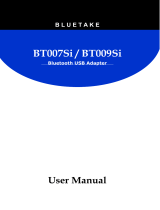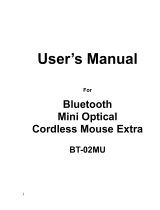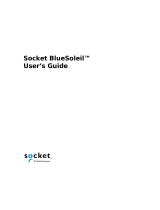
IVT BlueSoleil™ User Manual
Copyright © 2001, IVT Corporation, http://www.ivtcorporation.com
All specifications are preliminary and subject to change without notice.
2
Contents
1
BlueSoleil™ Introduction............................................................................1
1.1 Profiles ....................................................................................................1
1.2 New features in BlueSoleil 1.4 .....................................................................2
1.3 Features in BlueSoleil 1.2 ...........................................................................2
2 BlueSoleil™ Basic Operations .....................................................................4
2.1 Start BlueSoleil™ ......................................................................................4
2.2 Exit BlueSoleil™ ........................................................................................4
2.3 BlueSoleil™ Main Window ...........................................................................5
2.4 Service Window.........................................................................................8
2.5 What You Need To Do Before Build A Connection ......................................... 10
2.6 Start Or Stop A Bluetooth Service Connection.............................................. 14
3 Bluetooth Security....................................................................................16
3.1 Introduction ........................................................................................... 16
3.2 BlueSoleil Security Configuration ............................................................... 17
4 Personal Area Networking........................................................................22
4.1 Introduction ........................................................................................... 22
4.2 Communication Between Two Computers.................................................... 23
4.3 Access LAN Through PAN-NAP ................................................................... 29
4.4 Access LAN Through IVT BlueSoleil™.......................................................... 33
4.5 Access Internet through IVT BlueSoleil™..................................................... 35
4.6 PAN Configuration ................................................................................... 36
5 Dial-Up Networking..................................................................................38
5.1 Introduction ........................................................................................... 38
5.2 Connect to a Dial-up Gateway from a Computer........................................... 38
5.3 Settings for Dial-up Networking Profile (client side) in Windows98/Me............. 41
6 Bluetooth Serial Port................................................................................46
6.1 Introduction ........................................................................................... 46
6.2 Connect Two Computers........................................................................... 46
6.3 Use SPP to Print a Document..................................................................... 48
6.4 Use a cellphone to control a computer ........................................................ 48
6.5 SPP Configuration.................................................................................... 50
7 Bluetooth File Transfer.............................................................................52
7.1 Introduction ........................................................................................... 52
7.2 Transfer files to/from a Computer .............................................................. 52
7.3 FTP Configuration .................................................................................... 55
8 LAN Access...............................................................................................56
8.1 Introduction ........................................................................................... 56
8.2 Access a Local Area Network (LAN) ............................................................ 56
8.3 Access a LAN via a LAN Access Point .......................................................... 60
8.4 Settings for LAN Access Profile (client side) in Windows98/Me........................ 61
8.5 Usage of LAN Access Profile (server side) in Windows98/Me........................... 65
9 Object Push.............................................................................................. 70
9.1 Introduction ........................................................................................... 70
9.2 Transfer Objects from a Computer to a Bluetooth Cellular Phone .................... 70
























